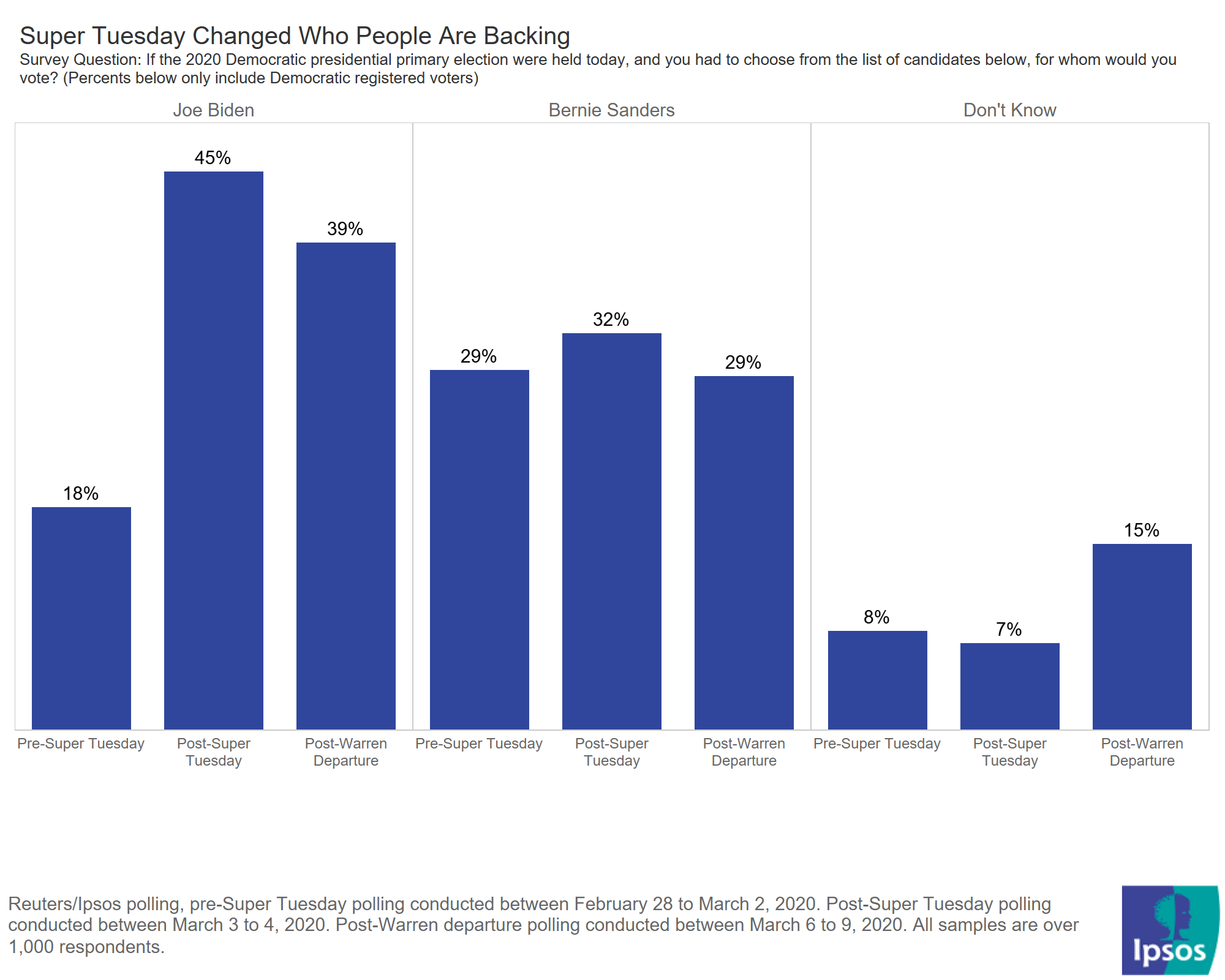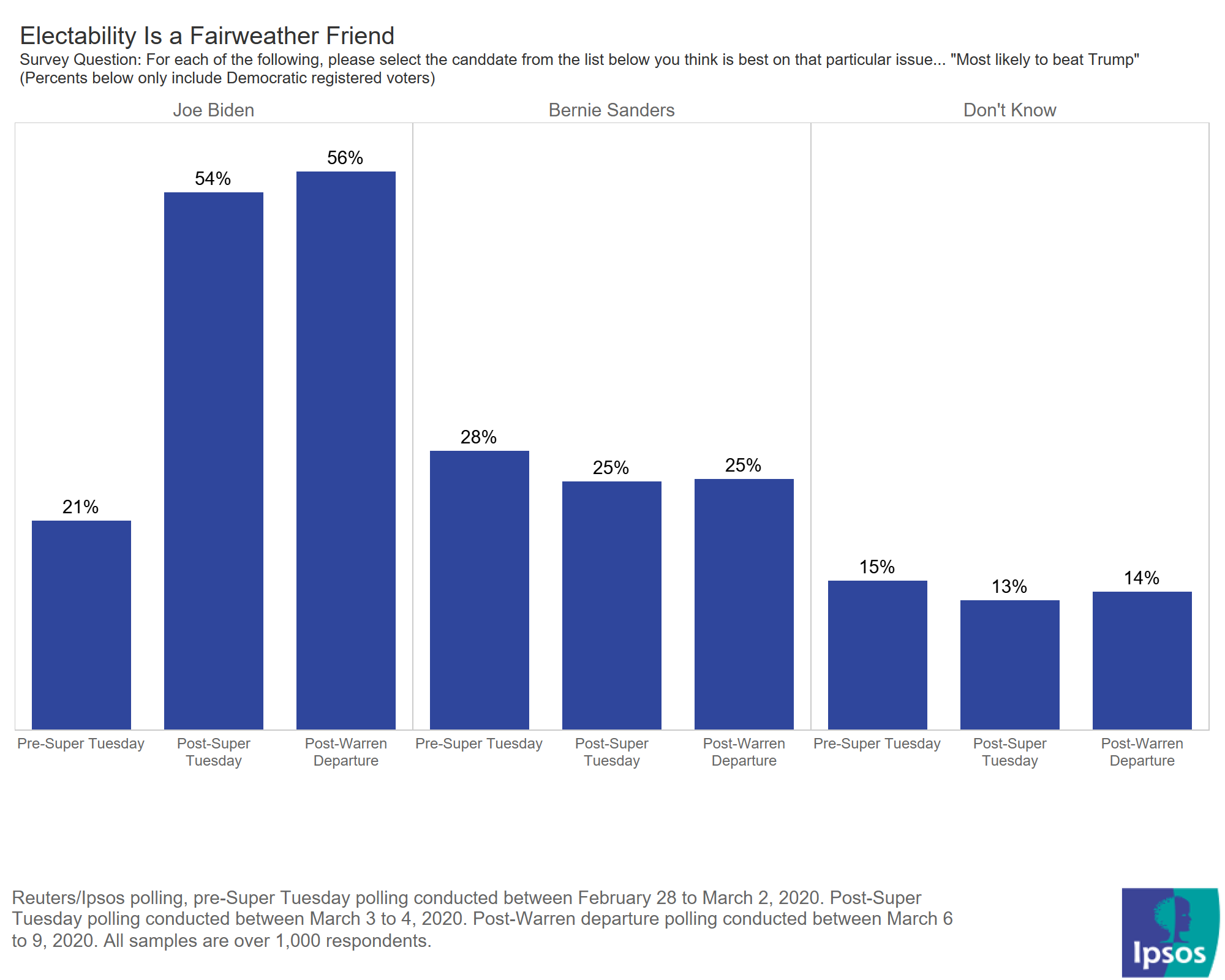And Then There Were Two
The Democratic primaries are down to just two high profile candidates after South Carolina and Super Tuesday upended the race with a number of game changing turns.
After Super Tuesday, Biden took the delegate lead from Sanders, who enjoyed frontrunner status in the early states following Biden’s initial disappointing finishes in Iowa, New Hampshire, and Nevada. Moderators at the South Carolina debate, just over a week ago, were even asking Biden if he planned to drop out of the race if he failed to win the Palmetto State Primary, a testament to how quickly the race has changed.
So, once the Super Tuesday dust settles and with two-thirds of delegates still to be awarded, where will voters who were set on Bloomberg, Buttigieg, Klobuchar, or Warren go? Will allegiances shift to Biden or Sanders?

Biden benefited the most from the departures of his more moderate competitors growing nearly 20-points from February 28 to March 6, Reuters/Ipsos polling finds. Beyond this singular poll, Sanders’ poll average overall has climbed slightly, while Biden’s numbers have surged, according to the national polling averages tracked by Ipsos’ Political Atlas.
Since then, Democratic voters have cooled somewhat to Biden, with support for his candidacy dropping six points just a few days later. While the share of democratic voters who don’t know who they will support has doubled, following Senator Elizabeth Warren’s exit from the race.
What Warren’s departure from the race means for Sanders and Biden
Leading up to Super Tuesday, people who backed Warren were most likely to say that Sanders was their second choice, followed by Biden.
After Super Tuesday, they had different ideas. Warren’s remaining supporters were statistically split between backing Sanders as a second choice (47%) and going with Biden as a fall back (46%) – though it is important to note that the polling sample of Warren supporters was less than 100 people given her dwindling support in the waning days of her campaign.
With polling done since Warren’s exit, we can see that her supporters are perhaps not sure who to back next, absent an endorsement from the Massachusetts senator. With 352 delegates up for grabs today, where that support is centered could be just as important as these aggregate, national numbers.
Have voters fully made up their minds yet?
Possibly not. The race could still be volatile.
Voters’ certainty has been a huge deciding factor this cycle. Exit polls from Super Tuesday show that Biden trounced Sanders among late deciding voters. They were most likely influenced by the dropouts and endorsements of the past few days, speaking to how fluid this primary is. Klobuchar also won her third-place finish in New Hampshire and overperformed her poll numbers by double-digits in large part due to sweeping late deciding voters.
Performing well among this group of Democrats poses an upside to Biden: about 15% of democratic registered voters don’t know who they would vote for in the primaries, a number that’s doubled in recent polling. This gives him some space to grow.
States with lots of early voting, like California, swung to Sanders, indicating that those voters had already made up their minds before Super Tuesday. This brings up a perennial problem for his campaign: can they expand beyond this core group of supporters?
Electability Is a Fairweather Friend

A key voter consideration in the 2020 primaries has centered around electability, or, to put it more bluntly, who can beat Trump?
Our pre- and post-Super Tuesday findings show just how quickly views on electability change. Prior to Super Tuesday, Sanders was beating Biden on the ability to beat Trump question. With moderates rallying around him and Biden winning hundreds of delegates, he has surged on this key metric, nearly tripling his standing in a matter of days. Sanders has not improved or declined here, perhaps due to his loyal base of support. Interestingly, Warren’s departure has not moved these numbers much, given how low she ranked on this question.
What’s easily won can be quickly taken away. While Biden is looking strong on this question now, he still holds some weaknesses that could ultimately hurt him in the future. A bad debate performance, one of his famous gaffes, and Republicans furthering their Ukrainian investigation of his son, all could make voters question his electability claims. Only last month, Biden’s own electability numbers toppled 20-points after his shaky start in the first three first primary states.
One thing is for certain: in a year all about electability, winning elections certainly helps.



